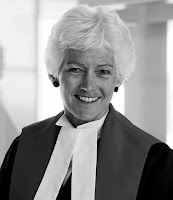 |
| Justice John C. Bouck |
In his landmark exposee of the role of the
Chief Judge or
Chief Justice in
Canada's various courts,
John C. Bouck, a courageous
Canadian judge, appealed directly to the public for reform in 1998 with a series of articles appearing in a prominent
Canadian newspaper.
Justice Bouck candidly explained that the court system operated like a hockey team. The Chief Judge, like the hockey coach who decided which players get to play in the game, decided which judges would hear certain cases.
Bouck wrote that there "A- Team" of key players or judges who were favoured by the Chief Justice and "B-Team" of less reliable judges or players.
Bouck wrote that judges from the A-Team were selected by the
Chief Justice to handle certain the
Chief Justice felt were important while judges from the B-Team were given cases that had no or little importance.
What
Bouck did not write but what arises as the natural implication from his comments was that the
Chief Justice was controlling the outcome of various law cases by the selection of judges he or she could rely on to deliver the verdict that the
Chief Justice wished to have delivered.
The implicit conclusion that
Chief Justices in
Canada manage the outcome of certain law cases is supported by the available data gleaned from many key law cases where certain judges in
Canada are regularly observed appearing in certain key cases and then twisting, perverting, bending and breaking the law in order to obtain a certain result.
Bouck reasoned that one simple way to reform the process was to reform the position of
Chief Justice or
Chief Judge.
In the case of Canada's superior courts, which include the Supreme Court of Canada, the Federal Court of Appeal, the Federal Court, the Courts of Appeal and superior courts for all Canadian provinces and territories the Chief Justices in Canada are chosen for their positions by the
Prime Minister of Canada and his cabinet
with the approval of the
Queen or
Governor General and they hold that position until they resign or retire. The retirement age is fixed at age 75 by the
Judges Act and Chief Justices in Canada often hold the office for ten years or more giveing rise to complaints of cronyism and other forms of corruption.
In the case of
Provincal Courts, the
Chief Judge is appointed by the local provincial
Premier and her cabinet with the approval of the
Queen's representaitve the
Lieutenant Governor.
Bouck aregued that this was wrong.
Bouck argued that the best people to select a
Chief Justice was not a politcian who knew nothing about managing a court but instead the judges of the court shold elect one of their members whom they respected and felt was capable and fit for the job, just like a hockey team elects its captain, like the House of Commons elects its speaker or like the Cardinals of Catholic Church elects its Pope.
Bouck also argued that the term of office should be fixed which would enable the judges of the court to control egomaniacal despots from taking over thge system.
Bouck suggested a terms of five years would be reasonable.
The
Canadian Committee for Constitutional Courts has carefully reviewed the proposals of
Justice John Bouck and advocates that those proposals be adopted, immediately, as a first step towards the establishment of a court system that complies with the requirements of
Canadai's Constitution and the provisions of the
United Nations Univeral Declaration of Human Rights and the
United Nations
Covenant on Political and Civil Rights that mandate an independent and impartial tribunal for the hearing of civil and criminal disputes.
For
Chief Justices appointed by the
Prime Minister of Canada and his cabinet this would require an appropriate amendment to the
Judges Act which sets out the mandatory retirement ages for such judges.
In the case of
Provincial Court Chief Judges, a similar amendment would have to be made to the applicable legislation.
What
Justice Bouck did not address was the role the the of the
Chief Justice or
Chief Judge in matters involving complaints of judicial misconduct.
At the present time, the
Chief Justice of Canada, who is also the
Chief Justice of the Supreme Court of Canada, is the
Chairperson of the
Canadian Judicial Council, a body made up solely of Chief Justices and Associate Chief Justices of Canada's superior courts and courts of appeal. The
Canadian Judicial Council is charged with the responsibility of investigating complaints of mis-conduct by Canada's federally appointed judges. The obvious problem is that where a Chief Justice selects a member of his "A-Team" of judges to deliver a desired verdict that
Chief Justice will naturally use his or her influence to make sure that complaints about judges involved in such verdicts are nre not treated seriously or are rejected on improper grounds. There are so many well documented cases where this has taken place that Canadians no longer trust the Canadian judiciary as they once did before the
Canadian Judicial Council was established in by
Canada's, self admitted,
communist Prime Minister, Pierre Trudeau, as part of his long term strategy to turn Canada over to the international elites that intend to establish a one world government controlled by a self-selected oligarchs.
The
Canadian Committee for Constitioional Courts submits that a proper reform of the office of the
Chief Justice would require a reform of the system that reviews judicial mis-conduct.
Chief Justices should be completely removed from the process of examining and investigating complaints of judicial misconduct except in cases where their evidence is required to assist a hearing panel in their deliberations.











